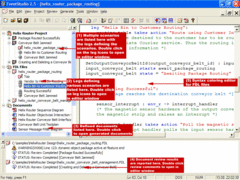 Overview |
 Comments (0) |
 Ratings (0) |
 Download |

|
||||||||||||||||||||
|
Search
Software
Advertisements!
Free-downloads
|
Options for EventStudio Sequence Diagram Designer
Advertisement
EventStudio Sequence Diagram Designer
When modeling with EventStudio, developers describe the interactions in the system in terms of a simple declarative modeling language. EventStudio then analyzes the model for design errors, inconsistent operations, resource leaks and invalid timer operations. Once the design issues have been addressed, EventStudio automatically generates sequence diagrams and collaboration diagrams. EventStudio allows the developers to explore a large number of success and failure scenarios without the overhead of individually documenting each scenario. The developers define a base scenario and then define other scenarios by just specifying the differences with the base scenario. EventStudio manages the scenario definitions and generates the documents by merging the base scenario with the specified differences for each scenario. EventStudio automatically handles diagram layout, formatting, scaling and page breaks for sequence diagrams and collaboration diagrams generated in the Adobe PDF and Microsoft Word Picture (EMF) formats. This allows the developers to focus on system architecture and design, without getting bogged down by document layout issues. EventStudio has been designed to handle diagram generation for systems with a large number of interacting objects. For greater modularity, objects in the system can be classified into groups and sub-groups. This classification is used to generate diagrams that focus on a particular aspect of the system. Advertisement
|
|||||||||||||||||||
